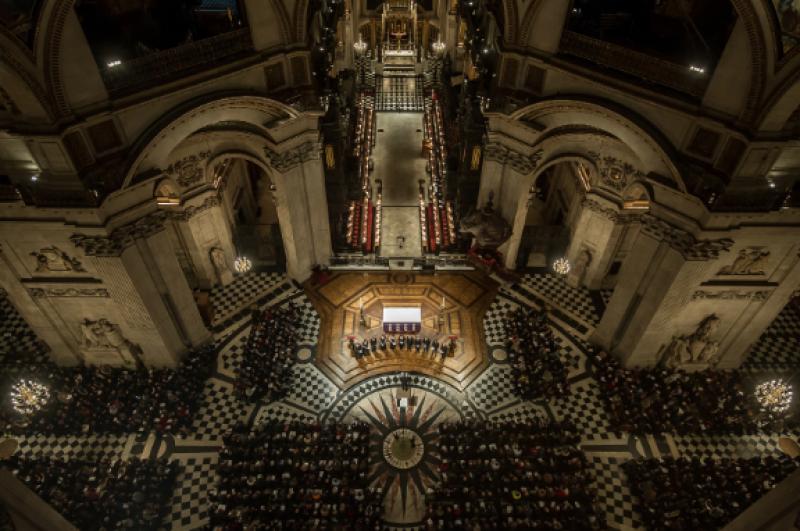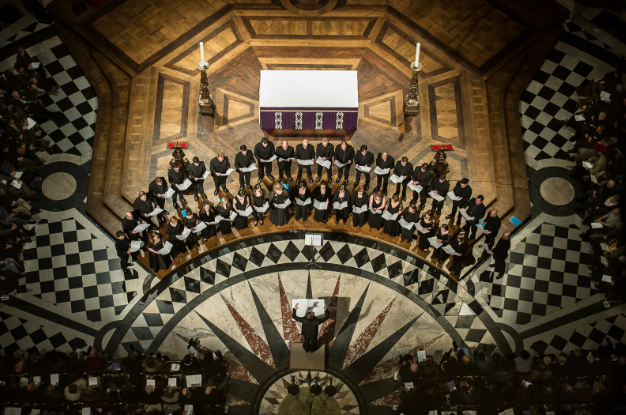The Tallis Scholars, St Paul's Cathedral | reviews, news & interviews
The Tallis Scholars, St Paul's Cathedral
The Tallis Scholars, St Paul's Cathedral
A captivating start to the choir's 40th birthday tour

In November 1973 a 20-year-old music scholar from St. John’s College, Oxford conducted the first ever concert by the newly founded Tallis Scholars, in St. Mary Magdalen, Oxford. Anyone who was there might have sensed that a new era was beginning. David Munrow was still alive: the period instrument revolution was just taking off.
Except that, modestly, he would insist it had a forerunner. Once he arrived amid the dreaming spires, Phillips made a regular pilgrimage down to Magdalen College chapel: partly, to see the legendary Bernard Rose conducting the college’s all-male choir. Byrd, Tallis, Weelkes, even the fiendishly difficult Tomkins Great Service were all on the menu.
Phillips took Tallis's Spem in Alium, to my mind, unwarrantably slowly
But above all Phillips went to hear the Clerkes of Oxenforde, founded by David Wulstan, whose girls sang like boys and who could turn the treble and mien – or second soprano - lines into fabulous traceries of sound that the sublime Magdalen acoustic transformed into the ethereal. It was a life-changing experience.
That same young undergraduate is now a Chevalier de l’Ordre des Arts et des Lettres, in recognition of his services to French culture. The Tallis Scholars’ new five-star recording of Jean Mouton, nominated for a BBC Music Magazine Award, is one of countless triumphs of four decades of recording on their own label.
Phillips has now embarked, in a reverberant St Paul’s, on a landmark 40th-anniversary programme. What an acoustic. The effect on the choir’s singing, as Malcolm Archer, John Scott and now Andrew Carwood have long proved, is quite sensational. Take, for example, perhaps the most staggering of the pieces Phillips offered to a packed and aghast cathedral audience: a short and almost never heard Miserere by Tallis.
 The wonderful way the choir shaped these unbroken legato lines (as later in Byrd’s Tribue, Domine) produced music one would gladly hear at one’s graveside. The pacing, growth and fall, alternation of full harmony and monody, and strangely tolling, rising scalic passages in this Miserere were out of this world.
The wonderful way the choir shaped these unbroken legato lines (as later in Byrd’s Tribue, Domine) produced music one would gladly hear at one’s graveside. The pacing, growth and fall, alternation of full harmony and monody, and strangely tolling, rising scalic passages in this Miserere were out of this world.
Not all was perfect. The choir took a time to get into its stride – the opening Tallis (Loquebantur variis linguis) exhibited little of give and, let alone of the variety that text surely cries out for. Words, in that other wonderful Miserere, Allegri’s, were often inaudible even when you followed the Latin, though the soprano was delicious (in the descending as well as ascending sequence); and the tenor solo quite fabulous. Phillips’ beat, with an odd caress of the left hand thrown in, looks almost as beautifully irrelevant as George Guest’s swirlings used to look.
But somehow it didn’t matter. The choir mostly grasped what he meant, or at least, the meticulously rehearsed machinery worked by some wonderful osmosis or autopilot.
Listening to Arvo Pärt’s breathtakingly beautiful, at times susurrating Nunc Dimittis, one realised that Phillips has not stood still. Once almost too purified, so that, while wildly beautiful, it could sound (oxymoronically) like crystalline succulence, the Tallis Scholars’ sound – with a partly new team of singers – has modified. It has less prissiness, perhaps more body or fibre, yet the pianissimi are just as mesmerising.
There were plenty of familiar faces, all first-rate. In fact Phillips wheeled out 40 of them, for a Tallis Spem in Alium which he took, to my mind, unwarrantably slowly – a bit like "Eternal Ruler of the ceaseless round" done as a Bruckner adagio. The material didn’t, here, quite live up to it; it became almost clichéd. Unlike their spectacular recording.
More affected by a slow, tortoise pace was the London premiere of one of the newer works: Robin Walker’s 40-part "I have thee by the hand, O man", a kind of dialogue between God and man which a slow, and possibly even jerky, pace merely made ponderous, the stop-start texturing and musical material itself neither thrilling nor convincing.
Phillips’ special achievement always is to create a wonderful blend
The choir commissioned a tender, beautiful, ambiguously Marian anthem, Sainte-Chapelle ("Castissima virgo…"), from Grammy-winning American composer Eric Whitacre, which really did warrant the attention. Nevada-born Whitacre, not much over 40, who studied at New York’s Juilliard with John Corigliano and David Diamond, arguably went through a saccharine compositional phase, to which he still perhaps inclines; but a growth in stature has matched his growing reputation. He does have his own voice and sensibility, one that reaches beyond the Medieval, Pärt and Gorecki to yield something urgent and nearly new. Tensions between a tonic and, effectively, chromatic, step-like descents from it were one salient ingredient here; an angelic feeling - wholly apt - for the words was another.
But Phillips and the singers apart, the hero of this concert was the characterful Gabriel Jackson, who at 50 seems still to be able to turn out one choral masterpiece after another. Ave dei Patris Filia is a substantial score, proving yet again that Jackson can do big structures (think of Tallis or Robert Carver) as well as the more curt.
He engages with effects, but makes them integral. The paired voice aubade with which it opens, first sopranos scintillating, then seconds even more ravishing, was treat enough. But the work unfolded fascinating detail, with lots to say and inspired ways of saying it. Phillips’ special achievement always is to create a wonderful blend in which you can hear every single individual voice, even when they’re in 10, 12 or 40 parts. It’s a wonderful gift, and it makes an audience’s experience utterly enthralling.
What a magical and uplifting 40th birthday. We left walking on air.
- The Tallis Scholars' tour continues tonight at Manchester’s Bridgewater Hall and at London's Cadogan Hall on Wednesday 29 May
rating
Explore topics
Share this article
Add comment
The future of Arts Journalism
You can stop theartsdesk.com closing!
We urgently need financing to survive. Our fundraising drive has thus far raised £49,000 but we need to reach £100,000 or we will be forced to close. Please contribute here: https://gofund.me/c3f6033d
And if you can forward this information to anyone who might assist, we’d be grateful.

Subscribe to theartsdesk.com
Thank you for continuing to read our work on theartsdesk.com. For unlimited access to every article in its entirety, including our archive of more than 15,000 pieces, we're asking for £5 per month or £40 per year. We feel it's a very good deal, and hope you do too.
To take a subscription now simply click here.
And if you're looking for that extra gift for a friend or family member, why not treat them to a theartsdesk.com gift subscription?
more Classical music
 Goldscheider, Brother Tree Sound, Kings Place review - music of hope from a young composer
Unusual combination of horn, strings and electronics makes for some intriguing listening
Goldscheider, Brother Tree Sound, Kings Place review - music of hope from a young composer
Unusual combination of horn, strings and electronics makes for some intriguing listening
 theartsdesk Q&A: composer Donghoon Shin on his new concerto for pianist Seong-Jin Cho
Classical music makes its debut at London's K-Music Festival
theartsdesk Q&A: composer Donghoon Shin on his new concerto for pianist Seong-Jin Cho
Classical music makes its debut at London's K-Music Festival
 Helleur-Simcock, Hallé, Wong, Bridgewater Hall, Manchester review - moving lyricism in Elgar’s concerto
Season opener brings lyrical beauty, crisp confidence and a proper Romantic wallow
Helleur-Simcock, Hallé, Wong, Bridgewater Hall, Manchester review - moving lyricism in Elgar’s concerto
Season opener brings lyrical beauty, crisp confidence and a proper Romantic wallow
 Kohout, Spence, Braun, Manchester Camerata, Huth, RNCM, Manchester review - joy, insight, imagination and unanimity
Celebration of the past with stars of the future at the Royal Northern College
Kohout, Spence, Braun, Manchester Camerata, Huth, RNCM, Manchester review - joy, insight, imagination and unanimity
Celebration of the past with stars of the future at the Royal Northern College
 Jansen, LSO, Pappano, Barbican review - profound and bracing emotional workouts
Great soloist, conductor and orchestra take Britten and Shostakovich to the edge
Jansen, LSO, Pappano, Barbican review - profound and bracing emotional workouts
Great soloist, conductor and orchestra take Britten and Shostakovich to the edge
 Jakub Hrůša and Friends in Concert, Royal Opera review - fleshcreep in two uneven halves
Bartók kept short, and a sprawling Dvořák choral ballad done as well as it could be
Jakub Hrůša and Friends in Concert, Royal Opera review - fleshcreep in two uneven halves
Bartók kept short, and a sprawling Dvořák choral ballad done as well as it could be
 Hadelich, BBC Philharmonic, Storgårds, Bridgewater Hall, Manchester review - youth, fate and pain
Prokofiev in the hands of a fine violinist has surely never sounded better
Hadelich, BBC Philharmonic, Storgårds, Bridgewater Hall, Manchester review - youth, fate and pain
Prokofiev in the hands of a fine violinist has surely never sounded better
 Monteverdi Choir, ORR, Heras-Casado, St Martin-in-the-Fields review - flames of joy and sorrow
First-rate soloists, choir and orchestra unite in a blazing Mozart Requiem
Monteverdi Choir, ORR, Heras-Casado, St Martin-in-the-Fields review - flames of joy and sorrow
First-rate soloists, choir and orchestra unite in a blazing Mozart Requiem
 Cho, LSO, Pappano, Barbican review - finely-focused stormy weather
Chameleonic Seong-Jin Cho is a match for the fine-tuning of the LSO’s Chief Conductor
Cho, LSO, Pappano, Barbican review - finely-focused stormy weather
Chameleonic Seong-Jin Cho is a match for the fine-tuning of the LSO’s Chief Conductor
 Classical CDs: Shrouds, silhouettes and superstition
Cello concertos, choral collections and a stunning tribute to a contemporary giant
Classical CDs: Shrouds, silhouettes and superstition
Cello concertos, choral collections and a stunning tribute to a contemporary giant
 Appl, Levickis, Wigmore Hall review - fun to the fore in cabaret and show songs
A relaxed evening of light-hearted fare, with the accordion offering unusual colours
Appl, Levickis, Wigmore Hall review - fun to the fore in cabaret and show songs
A relaxed evening of light-hearted fare, with the accordion offering unusual colours
 Lammermuir Festival 2025, Part 2 review - from the soaringly sublime to the zoologically ridiculous
Bigger than ever, and the quality remains astonishingly high
Lammermuir Festival 2025, Part 2 review - from the soaringly sublime to the zoologically ridiculous
Bigger than ever, and the quality remains astonishingly high

Comments
I so wish I could have been
It was really quite
For the record, Robert